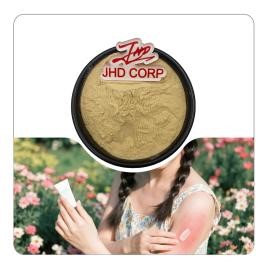Welcome to JHD Nutrasource!
Shop
Genistein
Genistein is a significant isoflavone, a type of phytoestrogen predominantly sourced from soybeans and certain legumes. It is a polyphenol compound with a characteristic chemical structure. In appearance, it often exists as a fine powder, typically white to off-white. Genistein has drawn considerable attention in the fields of nutrition and health due to its potential biological activities.
Description
| Product Name | Genistein |
| Appearance | white to off-white crystalline powder |
| Specification | ≥98% |
| Test Method | HPLC |
| Source | the soybean (Glycine max) plant |
| Certificate | USP/EP/JP/Kosher/Halal/GMP |
| CAS No | 446-72-0 |
| MF No | C₁₅H₁₀O₅ |
Function:
- Antioxidant Function: Genistein functions as a potent antioxidant, scavenging free radicals that can damage cells and contribute to various diseases. It helps protect against oxidative stress, which is linked to aging, inflammation, and chronic conditions. By neutralizing free radicals, it maintains cellular health and reduces the risk of oxidative damage to DNA, proteins, and lipids.
- Hormonal Modulation: As a phytoestrogen, genistein can interact with estrogen receptors in the body. It has both agonistic (mimicking estrogen) and antagonistic (blocking estrogen) effects depending on the context. In postmenopausal women, it may help alleviate symptoms like hot flashes and vaginal dryness by acting as a weak estrogen substitute. It can also influence hormonal balance in other physiological processes, affecting the endocrine system in both men and women.
- Cancer Inhibitory Function: Genistein has been studied for its potential anti-cancer properties. It can interfere with various cellular processes involved in cancer development and progression. For example, it can inhibit angiogenesis (the formation of new blood vessels that tumors need to grow), suppress cancer cell proliferation, and induce apoptosis (programmed cell death) in cancer cells. It shows particular promise in cancers related to hormonal regulation, such as breast, prostate, and endometrial cancers.
- Cardiovascular Protection: Genistein can have beneficial effects on the cardiovascular system. It helps lower cholesterol levels, especially LDL (bad) cholesterol, and triglycerides. Additionally, it promotes vasodilation (widening of blood vessels), which can reduce blood pressure and improve blood flow. Its anti-inflammatory properties also contribute to preventing the development of atherosclerosis (hardening of the arteries).
- Bone Health Maintenance: It plays a role in maintaining bone density. Genistein stimulates the activity of osteoblasts (cells responsible for bone formation) and inhibits osteoclasts (cells that break down bone). This helps prevent osteoporosis, particularly in postmenopausal women who are at higher risk of bone loss due to decreased estrogen levels.
Application:
- Dietary Supplements: Genistein is commonly formulated into dietary supplements, often in capsule or tablet form. These supplements are targeted at individuals seeking to support various aspects of health, such as postmenopausal women looking to manage menopausal symptoms, those aiming to reduce the risk of certain cancers, or individuals concerned about cardiovascular health.
- Skincare Products: Due to its antioxidant and anti-inflammatory properties, genistein is incorporated into skincare products. It can help protect the skin from environmental damage, reduce signs of aging like fine lines and wrinkles, and soothe irritated skin. Creams, serums, and lotions containing genistein are available in the market.
- Functional Foods: Genistein is present in soy-based foods such as soybeans, tofu, and soy milk. These foods are considered functional foods, providing health benefits beyond basic nutrition. Some food manufacturers also fortify other products with genistein, such as cereals or energy bars, to enhance their nutritional profile and offer additional health benefits.
- Medical Research and Therapeutics: In the medical field, genistein is being studied for its potential therapeutic applications. Clinical trials are ongoing to evaluate its effectiveness in treating and preventing various diseases, including cancer, osteoporosis, and menopausal symptoms. It may also be used in combination with other treatments to enhance their efficacy.

